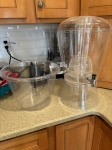Legality of garbage disposals
j_r said:
max_weisenfeld said:
Personally, I don't get the appeal. Animal waste in the garbage, vegetable in the compost. What is the loud messy disposal in the sink for?
As used in my kitchen the disposal is nonmessy and preferable to cleaning up the raccoon/skunk wreckage that results from leaving food in outdoor trash cans for days. I agree that when possible, composting is the best option.
When I get my disposal, I will still compost 90-95% of my vegetable waste as I do now. But the 5-10% that ends up mixed with "who knows what" in the drainbasket of my sink will go into the disposal along with other "wet food garbage" rather than into the trash. Our trash going into the landfill will be even smaller than now. Thanks to composting and recycling, we put out less than one trash can full per week, sometimes less than two per month as it is. If we keep the smelly food out of it, that will reduce the volume of it further as well as reducing the raccoon/etc. concerns.
sac said:
j_r said:
max_weisenfeld said:
Personally, I don't get the appeal. Animal waste in the garbage, vegetable in the compost. What is the loud messy disposal in the sink for?
As used in my kitchen the disposal is nonmessy and preferable to cleaning up the raccoon/skunk wreckage that results from leaving food in outdoor trash cans for days. I agree that when possible, composting is the best option.
When I get my disposal, I will still compost 90-95% of my vegetable waste as I do now. But the 5-10% that ends up mixed with "who knows what" in the drainbasket of my sink will go into the disposal along with other "wet food garbage" rather than into the trash. Our trash going into the landfill will be even smaller than now. Thanks to composting and recycling, we put out less than one trash can full per week, sometimes less than two per month as it is. If we keep the smelly food out of it, that will reduce the volume of it further as well as reducing the raccoon/etc. concerns.
What happens to the solid waste that goes through the water processing? The biomass that is contributed by disposals goes into a larger category called "sludge." 60% of Essex County's is shipped out-of-state, mostly as "landfill cover." 40% is used in-state, exclusively as "landfill cover." So most of it ends up in landfills anyway. These are the 2017 statistics, the latest I could find. https://www.nj.gov/dep/dwq/pdf/sludgeproductiondata2017.pdf
Many towns that combine water and sewage in one bill base the homeowner sewage cost on the amount of water consumed. Sewage cost is greater than the cost of water.
The work needed to convert sewage to acceptable sludge is tremendous. Which is why building and running sewage plants are expensive.
ps. - the $30 sewage charge is per quarter.
max_weisenfeld said:
sac said:
j_r said:
max_weisenfeld said:
Personally, I don't get the appeal. Animal waste in the garbage, vegetable in the compost. What is the loud messy disposal in the sink for?
As used in my kitchen the disposal is nonmessy and preferable to cleaning up the raccoon/skunk wreckage that results from leaving food in outdoor trash cans for days. I agree that when possible, composting is the best option.
When I get my disposal, I will still compost 90-95% of my vegetable waste as I do now. But the 5-10% that ends up mixed with "who knows what" in the drainbasket of my sink will go into the disposal along with other "wet food garbage" rather than into the trash. Our trash going into the landfill will be even smaller than now. Thanks to composting and recycling, we put out less than one trash can full per week, sometimes less than two per month as it is. If we keep the smelly food out of it, that will reduce the volume of it further as well as reducing the raccoon/etc. concerns.
What happens to the solid waste that goes through the water processing? The biomass that is contributed by disposals goes into a larger category called "sludge." 60% of Essex County's is shipped out-of-state, mostly as "landfill cover." 40% is used in-state, exclusively as "landfill cover." So most of it ends up in landfills anyway. These are the 2017 statistics, the latest I could find. https://www.nj.gov/dep/dwq/pdf/sludgeproductiondata2017.pdf
This document is poorly organized IMHO, the 60/40 split is for the sewage authorities that have their facilities in Essex County. Maplewood and South Orange are served by the the Joint Meeting of Essex and Union Counties Sewage Authority, which has its facilities in Elizabeth (Union County). According to this document, ~50% of the sludge is classified as class a beneficial use and ~50% is classified as out of state beneficial use.
Komarovsky said:
max_weisenfeld said:
What happens to the solid waste that goes through the water processing? The biomass that is contributed by disposals goes into a larger category called "sludge." 60% of Essex County's is shipped out-of-state, mostly as "landfill cover." 40% is used in-state, exclusively as "landfill cover." So most of it ends up in landfills anyway. These are the 2017 statistics, the latest I could find. https://www.nj.gov/dep/dwq/pdf/sludgeproductiondata2017.pdf
This document is poorly organized IMHO, the 60/40 split is for the sewage authorities that have their facilities in Essex County. Maplewood and South Orange are served by the the Joint Meeting of Essex and Union Counties Sewage Authority, which has its facilities in Elizabeth (Union County). According to this document, ~50% of the sludge is classified as class a beneficial use and ~50% is classified as out of state beneficial use.
Ok, I see that. Good point on the hyper local front, but on a more macro scale, over 19% in New Jersey is incinerated, which is by far the worst solution. About 60% is in-state and out-of-state landfill cover, and less than 12% is type a beneficial, which can be used as fertilizer.
Employment Wanted
Latest Jobs
Employment Wanted
-
Apr 30, 2024 at 4:17pm
Help Wanted
-
PT Driving mother’s Helper needed
May 1, 2024 at 10:31am
-
May 1, 2024 at 9:10am
-
May 1, 2024 at 9:10am
-
Part-time Nanny in Scotch Plains
May 1, 2024 at 9:10am
-
May 1, 2024 at 9:10am
-
May 1, 2024 at 9:10am
-
Full-time Nanny in Scotch Plains
May 1, 2024 at 9:10am
-
Nanny Wanted Live in or Live out $1400-$1600
May 1, 2024 at 4:49am
-
(929)-390-1830 Help Wanted Aides & Non-Certified Aides Wanted $1800 Cash
May 1, 2024 at 4:44am
Lessons/Instruction
For Sale
-
REVO luggage $100
More info
Garage Sales
-
Huge Garage Sale Sale Date: May 4, 2024
More info




















I believe the rules are according to the township plumbing code. They are prohibited in Maplewood, although I a lot of people have them installed illegally and many plumbers will do it. However, there is one plumber known for reporting people who have one, whenever he sees it. I suppose they are an environmental risk, although they make disposing garbage much easier, IMHO. In my new town, we don't have one and the plumbing infrastructure both inside the house and outside wouldn't support it; and I can't say I miss it terribly, but then again there are less people using the kitchen than back in the day.